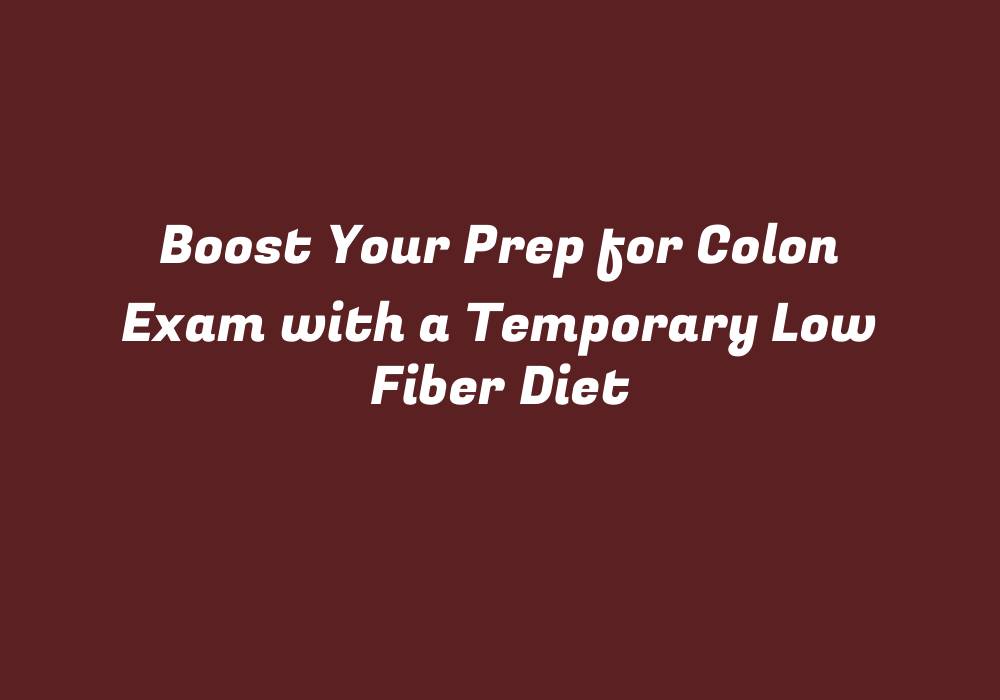Introduction
Preparing for a colonoscopy can be an overwhelming experience, especially if you’re unsure about what to expect during this procedure. However, proper dietary changes play a crucial role in ensuring a successful exam and effective bowel cleaning. In this article, we will focus on the importance of a temporary low-fiber diet in boosting your colonoscopy prep while adhering to medical advice from health professionals.
Understanding Colonoscopy Preparation
A colonoscopy is a minimally invasive procedure performed by a physician to examine the large intestine (colon) and rectum using a flexible, narrow tube called a colonoscope. The primary goal of this procedure is to identify and treat various digestive issues such as ulcers, inflammation, polyps, or even cancerous growths.
To achieve optimal visibility for an accurate diagnosis, it’s crucial to cleanse the colon thoroughly beforehand. This involves a combination of dietary modifications, fluid intake, laxatives, and sometimes enemas. One essential aspect of this preparation is adhering to a low-fiber diet in the days leading up to the exam.
The Role of Fiber in Colonoscopy Prep
Fiber plays a significant role in your overall digestive health, promoting healthy bowel movements by adding bulk and softening stool. However, during the preparation for colonoscopy, it’s vital to minimize fiber intake for several reasons:
1. Fiber absorbs water, which is essential for successful bowel cleansing. By reducing the amount of dietary fiber consumed, more water will be available to properly clean the colon and improve the efficacy of the prep regimen.
2. High-fiber foods can also cause bloating or gas, interfering with the examination process and potentially impacting your comfort during the procedure. By adopting a low-fiber diet, these issues are minimized.
3. Fiber is a component in undigested food, which could potentially complicate the bowel cleansing process if it remains in the colon. Opting for low-fiber meals before your exam helps ensure that the remaining fiber residues will be easily flushed out during the prep regimen.
Temporary Low Fiber Diet Guidelines
A temporary low-fiber diet typically starts a few days before the colonoscopy and may last for up to 3-5 days, depending on your doctor’s recommendations. During this period, you should focus on consuming mainly foods that are easily digested without causing discomfort or hindering the bowel cleansing process. Here’s a breakdown of some food choices:
Protein
– Lean meat and fish (chicken, turkey, salmon)
– Egg whites
– Low-fat dairy products like cheese and yogurt
– Tofu
– Soy products without added fiber
– Protein powders or shakes without fiber-based additives
Carbohydrates
– White bread, pasta, and rice (avoid whole grain varieties)
– Plain white potatoes
– White crackers
– Pasta
– Baked goods without added nuts or seeds
Fats
– Limit the intake of high-fat foods but include healthy fats like olive oil and avocado.
– Avoid fried food, fast food, and fatty meats.
Be Mindful of Processed Foods
It’s crucial to examine food labels carefully, particularly for added fiber ingredients such as bran, wheat germ, or other whole grain products. Stick with low-fiber options and avoid any high-fiber substitutes.
Hydration is Key
During the period leading up to your colonoscopy, it’s crucial to stay well-hydrated by drinking plenty of fluids such as water, clear soups, and low-calorie beverages like sports drinks. Adequate hydration will help maintain proper bowel function and optimize the effectiveness of the prep regimen.
Summary
Following a temporary low-fiber diet is an essential part of your colonoscopy preparation that can greatly impact the success of your examination. By focusing on easily digestible, fiber-free meals while maintaining proper hydration and following medical advice, you’ll be well-positioned to boost your prep for the colon exam and ensure a safe and comfortable procedure.
